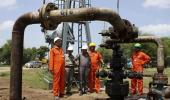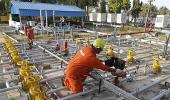'We plan to add over 100,000 square kilometres every year, to reach an ambitious target of 500,000 square kilometres by 2025.'

In the wake of ONGC discovering what it describes as 'notable findings' of oil and gas recently, Sushma Rawat, director (exploration) of the company spoke with Subhomoy Bhattacharjee/Business Standard on the company's strategy, tie ups with global majors and other issues.
How did you get to these finds?
ONGC's relentless pursuit of exploring untapped regions has yielded these finds.
By diligently analysing geological data and employing advanced technologies, the company has successfully identified substantial oil and gas reserves, reaffirming the untapped potential within the OALP blocks.
The discovery represents a momentous achievement, underscoring exploration and will expand domestic production to reduce India's reliance on imported oil and gas.
You have signed different types of agreements with international oil majors. How will they play out in the future for ONGC? What will you offer?
ONGC is keen to work with global majors as strategic partners in challenging areas and bring-in expertise in three key areas: deep water exploration, monetising the discovered fields on fast-track and enhancing production from mature fields through enhanced oil recovery and improved oil recovery techniques.
What we are looking forward to in collaborations is substantial value additions by the partners.
ONGC is open to giving equity stake in difficult fields to de-risk deep water/difficult ventures and bring capital in areas which are technology and capital intensive.
We are willing to collaborate with any entity who has a technology and risk appetite.
In some areas, we can have service providers, and in some other areas, we may have technology partners and include financial partners.
We have signed Heads of Agreement with ExxonMobil for collaboration in deep-water exploration in KG-Cauvery and Kutch offshore basins.
An MoU with Chevron for potential collaboration in the Tripura fold belt, Bengal offshore, KG-Cauvery.
A CA signed with TotalEnergies, France, for Andaman & Mahanadi offshore and an MoU with Equinor, Norway for various scope of work including upstream, midstream, marketing, renewables (offshore wind) and CCUS.
There is also an MoU signed with Shell to co-operate in CCUS studies, focusing on joint CO2 storage study and EOR screening assessment for 'key basins' in India, including depleted oil and gas fields and saline aquifers.
What were the critical shortages that made you tap these companies?
As I said, to harness the benefit of international expertise, risk sharing, technology and skill enhancement, as a strategic instrument.
Our deep/ultra-deep water exploration is very much in the forefront and is going to intensify in the years to come.
However, rig resource availability and prioritising resources will be a big challenge for exploration.
As you know, ONGC has adopted Energy Strategy 2040 as its strategic blueprint for the future in 2019.
The energy transition and future energy demand scenario were the fundamental drivers of the roadmap and, going along, it is clear that this transition is going to play an increasingly stronger role in charting out the future policies and strategies.
Will these tie ups lead to an increase in ONGC's investments for exploration since the company has only allocated an average exploration budget of Rs 31,000 crore (Rs 310 billion) annually for the three-year period ending FY24?
We already have a plan to intensify our exploration efforts and have been aggressively increasing our exploratory acreages through OALP.
In the next three years we plan an increase in CAPEX by 150 per cent for exploration compared to the last three fiscals.
In this respect, it is pertinent to mention that bringing reputed global E&P players in the Indian hydrocarbon industry may be a game changer and will help open a new vista.
ONGC is venturing into high-risk high-gain deep/ultra-deep water exploration on the east and west coasts of India.
For that, we have already acquired a few deep/ultra deep water exploration acreages under OALP in the Cauvery basin, Andaman basin and Mahanadi basin.
ONGC has already explored 200,000 square kilometres of Indian sedimentary geology.
We plan to add over 100,000 square kilometres every year, to reach an ambitious target of 500,000 square kilometres by 2025.
So our deep-water exploration is likely to see large capex.
Overall, we shall invest around $7 billion in the next 3-4 years to reverse the declining trend in oil and gas production.











